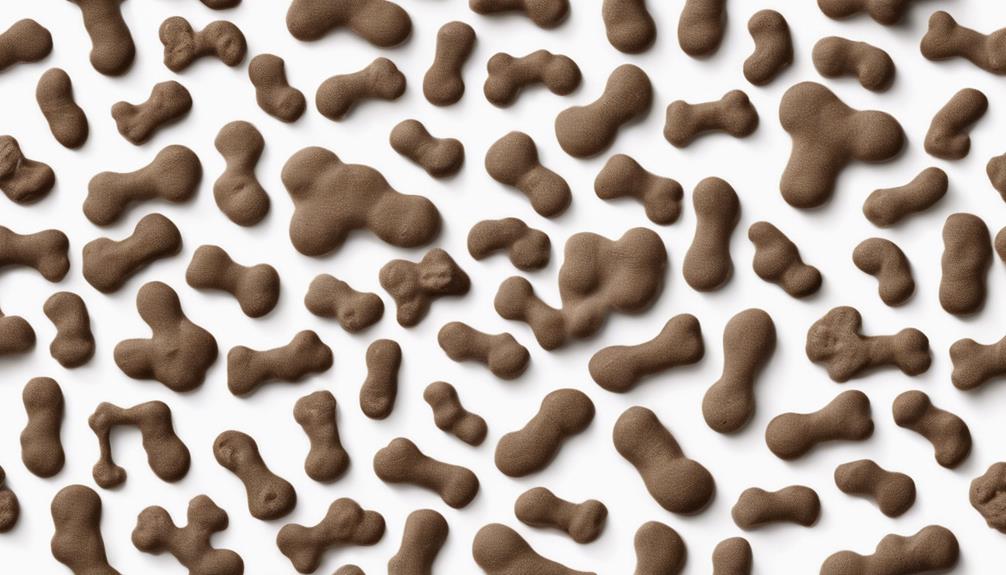As new parents, we often wonder about the number of poop diapers our newborn should have daily. Did you know that a breastfed newborn can have as many as eight to ten poop diapers a day, while formula-fed babies might have fewer?
Understanding what's important for your baby can be vital for their health and development. But what happens when there are changes in frequency or consistency? Let's explore the factors that influence newborn poop patterns and when to seek guidance from healthcare providers to make certain our little ones are thriving.
Key Takeaways
- Breastfed newborns: 1-6 poop diapers/day initially, decreasing to 1/week
- Formula-fed newborns: 1-4 poop diapers/day, larger bowel movements
- Meconium transitions to yellow, seedy stools
- Monitoring poop frequency aids in evaluating newborn's digestive health

Ubbi Disposable Diaper Sacks, Lavender Scented, Easy-To-Tie Tabs, Diaper Disposal or Pet Waste Bags, 200 Count
Durable & Leak-Proof: Securely holds diaper waste or pet waste, ensuring leak-proof disposal with easy-to-tie tabs for a…
As an affiliate, we earn on qualifying purchases.
As an affiliate, we earn on qualifying purchases.
Normal Frequency of Newborn Poop Diapers
Understanding the typical frequency of newborn poop diapers is important for evaluating their health and nutrition adequacy. Breastfed newborns usually have 1-6 poop diapers per day during the initial weeks of life, indicating effective digestion and nutrient absorption.
In contrast, formula-fed newborns may have slightly fewer poop diapers, typically around 1-4 per day. The passage of meconium in the first 24-48 hours after birth is normal for all newborns, followed by transformation stools as the digestive system matures.
Monitoring poop frequency beyond the early weeks is essential as some breastfed newborns may decrease to as little as one poop per week. These changes in poop frequency can offer valuable insights into the newborn's digestive health and feeding adequacy, helping caregivers assess if the infant is receiving sufficient nutrition and if their digestive system is functioning optimally.
Regular observation of a newborn's stool patterns can aid in maintaining their overall well-being.

Ingenuity Contoured Changing Pad – Includes Waterproof Changing Liner and Safety Fastening Strap with Quick-Release Buckle
COMFORTABLE: The Contoured Changing Pad features a double-layered top foam pad that keeps baby comfortable and cozy during…
As an affiliate, we earn on qualifying purchases.
As an affiliate, we earn on qualifying purchases.
Factors Affecting Newborn Poop Frequency

Breast milk composition plays a significant role in determining the frequency of poop diapers in newborns. Breastfed newborns tend to have multiple dirty diapers per day as breast milk is easily digestible. On the other hand, formula-fed newborns usually have fewer but larger bowel movements compared to their breastfed counterparts. The newborn poop frequency can vary widely, ranging from several times a day to once a week, influenced by the baby's digestive system. Meconium, the initial thick stool passed by newborns, is succeeded by interim stools with frequencies that may fluctuate.
- Breastfed newborns may have more frequent dirty diapers due to the nature of breast milk.
- Formula-fed newborns typically experience fewer but larger bowel movements.
- The variability in newborn poop frequency is linked to the individual baby's digestive system.
It is essential to monitor the number of poop diapers to ensure the newborn's digestive health and overall well-being.

My Brest Friend Nursing Pillow – Deluxe – Enhanced Comfort w/ Slipcover – Ergonomic Breastfeeding Pillow For Ultimate Support For Mom & Baby – Adjustable Pillow W/ Handy Side Pocket, Soft Rose
ERGONOMIC DESIGN: Elevate your nursing journey with our unique nursing pillow. The wrap-around feature ensures ideal positioning &…
As an affiliate, we earn on qualifying purchases.
As an affiliate, we earn on qualifying purchases.
Signs of Healthy Newborn Bowel Movements
In newborns, observing the frequency and consistency of bowel movements is crucial in evaluating their digestive health and overall well-being. A healthy newborn typically has at least one dirty diaper per day in the initial days of life. Breastfed newborns tend to have more frequent bowel movements compared to formula-fed babies. Initially, newborn poop consists of meconium, a sticky, greenish-black substance that changes to yellow, seedy stools for breastfed infants. Monitoring the number of dirty diapers can provide insights into the newborn's feeding patterns and digestive functions.
Changes in the frequency or consistency of bowel movements can sometimes indicate underlying health concerns in newborns. It's essential for parents to pay attention to their baby's dirty diaper count and the characteristics of their stool. If there are significant deviations from the norm or if parents have any concerns about their newborn's poop, seeking advice from a healthcare provider is recommended. Remember, monitoring your baby's bowel movements is a simple yet effective way to track their health and well-being.

Pedia-Lax Liquid Stool Softener for Kids, Ages 2-11, Berry Flavor, 4 Fl Oz
Gentle Constipation Relief: Softens stool to ease occasional constipation in children.
As an affiliate, we earn on qualifying purchases.
As an affiliate, we earn on qualifying purchases.
When to Seek Medical Advice

Monitoring your newborn's bowel movements is a valuable indicator of their digestive health, and knowing when to seek medical advice is essential for their well-being. If you notice any concerning signs related to your newborn's stool, it's vital to reach out to a healthcare provider promptly. Here are some key points to take into account:
- Early Intervention: If your newborn hasn't passed any stool within the first 24 hours after birth, seeking medical advice is essential to guarantee their well-being.
- Extended Periods without Bowel Movements: Consulting a pediatrician is recommended if your newborn goes more than 4 days without a bowel movement, as this could indicate an issue that needs attention.
- Changes in Poop Characteristics: Any changes in poop frequency, consistency, or color that appear unusual or worrying should prompt a discussion with the pediatrician to rule out any underlying problems.
Tracking and Monitoring Newborn Poop Patterns
Tracking newborn poop patterns provides valuable insights into their digestive health and overall well-being. By monitoring the frequency, consistency, and color of a newborn's bowel movements, caregivers can make sure they are adequately hydrated and receiving proper nutrition. Below is a table summarizing typical poop patterns for breastfed and formula-fed newborns:
| Aspect | Breastfed Newborns | Formula-Fed Newborns |
|---|---|---|
| Frequency | 1 to 6 or more bowel movements a day | 1-4 bowel movements a day |
| Consistency | Soft, seedy, mustard-yellow stools | Firmer, tan or yellow stools |
| Color | Mustard-yellow | Tan or yellow |
Understanding these differences in newborn poop characteristics can help in identifying any potential issues early on, making sure the baby's health and well-being. It is essential to note any significant deviations from these patterns and consult a healthcare provider if concerns arise. Regularly tracking and monitoring newborn poop can provide important information about their digestive system functioning and overall hydration status.
Frequently Asked Questions
How Often Should a Newborn Poop Chart?
We should expect newborns to have varying poop frequencies, with breastfed babies typically pooping more frequently than formula-fed ones. Keeping an eye on poop patterns aids in monitoring their health. Lack of pooping for 4 days warrants consulting a pediatrician.
How Many Poopy Diapers Should Newborns Have?
We've learned that newborns' poop frequency varies based on feeding. Crucial to track dirty diapers to monitor health. Changes in poop patterns signal feeding issues or health problems. Contact the pediatrician if no poop for over four days.
How Often Should You Check a Newborn's Poop?
We check a newborn's poop diapers frequently to monitor their digestive health. Any changes in frequency or color should be discussed with the pediatrician for guidance. Regular monitoring helps guarantee the baby's well-being.
How Many Meconium Stools Should a Newborn Have?
We can expect newborns to have 1-3 meconium stools within the first day of life. This dark greenish-black, sticky substance is a sign that their digestive system is working well. It consists of materials ingested in the womb.
Conclusion
In conclusion, keeping track of your newborn's poop patterns is essential for their well-being. By monitoring the frequency and characteristics of their bowel movements, you can guarantee they're healthy and thriving. Remember, the color, consistency, and frequency of their poop can provide valuable insights into their overall health.
So stay vigilant, observe with care, and seek medical advice if needed. Happy and healthy babies begin with mindful monitoring of their poop!









